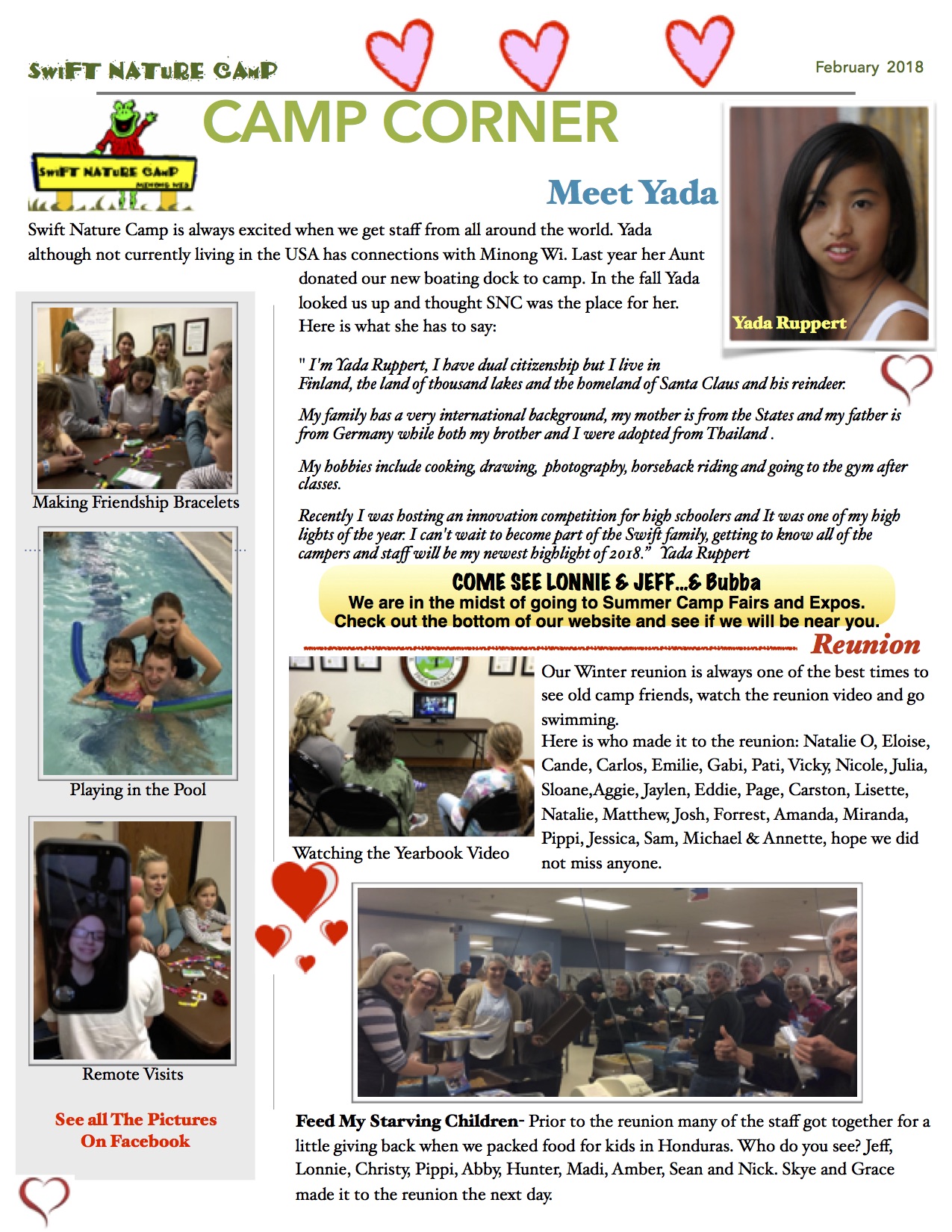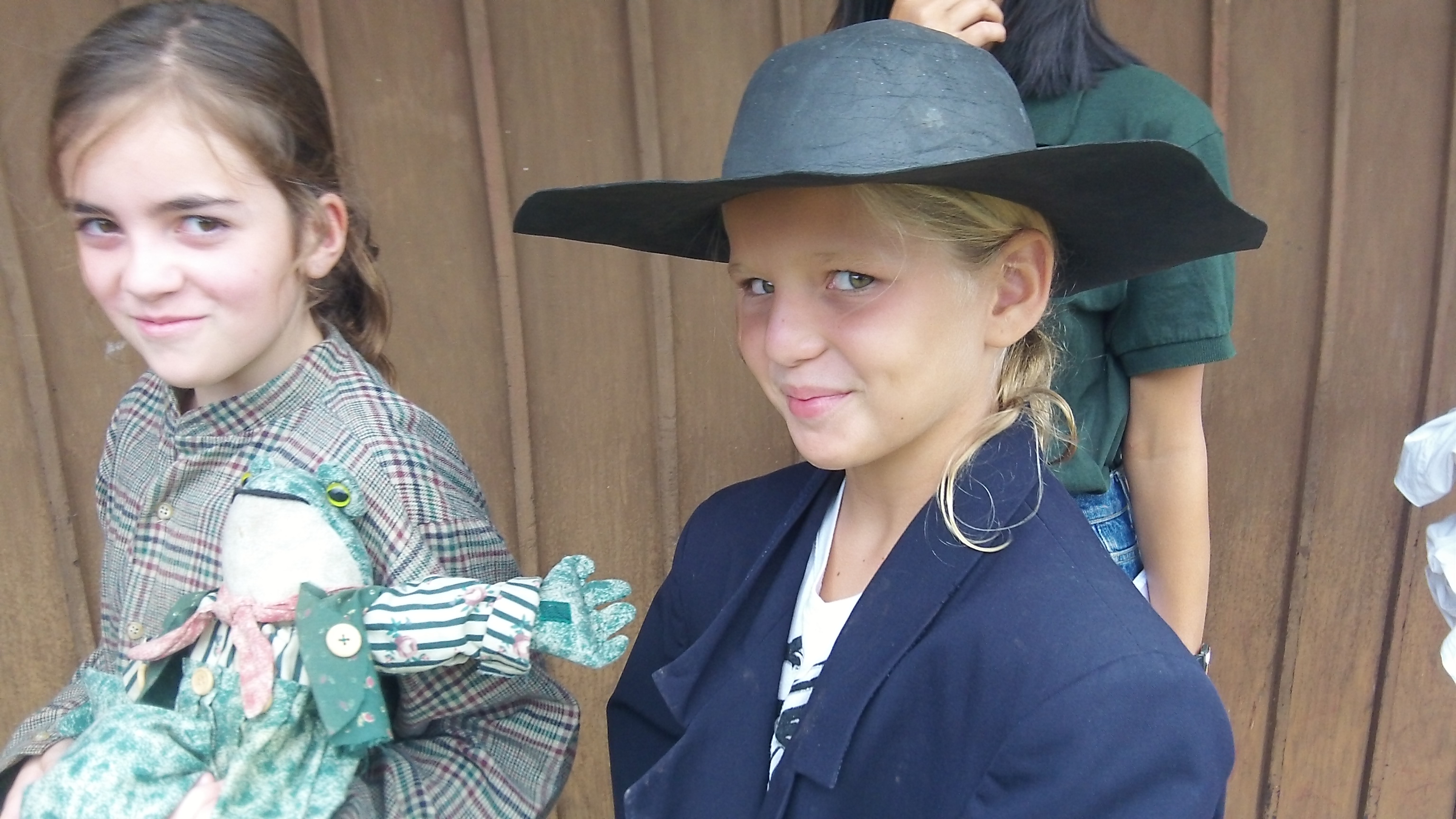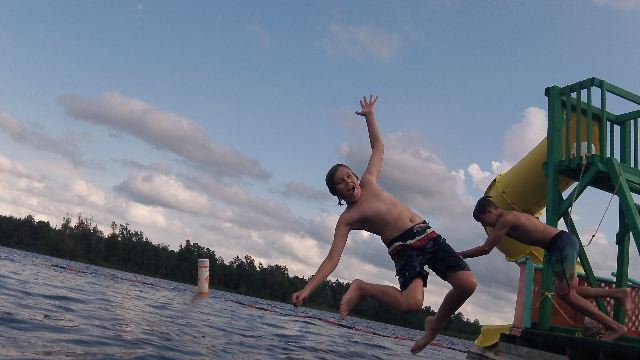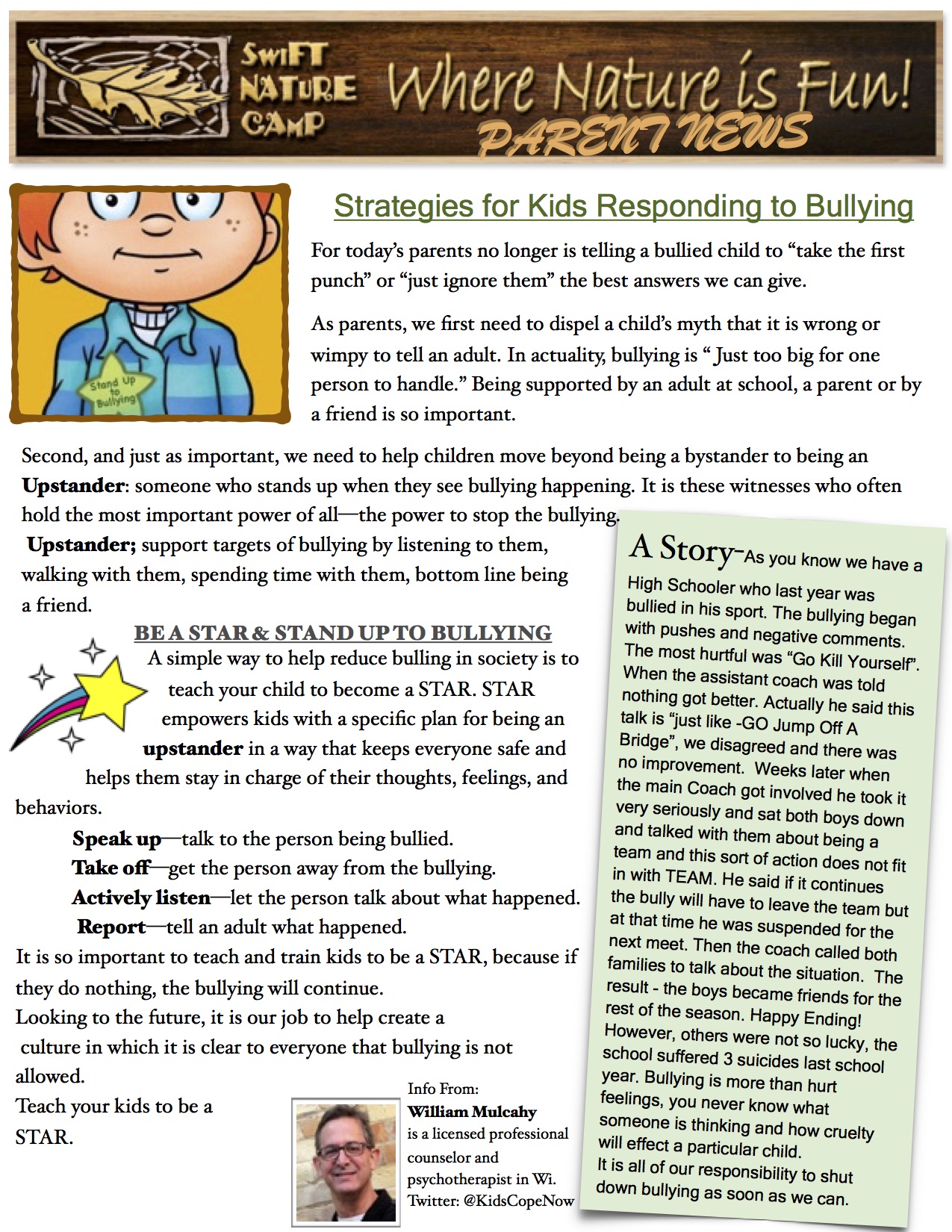 All the latest News from SNC
All the latest News from SNC

What's Next If You Are A Retired Nurse?
1-Summer Camp Nursing
Thousands of summer camps every summer are looking for a camp nurse. This is the perfect place for a retired cmap nurse. These positions are only during the summer and often are out in the country away from city life. Camp Director Jeff Lorenz says " Our camp nurse is a valuable part of the camp team. Although she only spends a few hours a day in the Health Center it is the other time when she is being a friend to campers or helping in the nature center or even at arts & crafts that makes he so valuable. She is part of the community of camp" So if you are looking for a place to be loved and appreciated while having fun, being a summer cmap nurse might just be the place to look. Many states are part of a compact that makes it easy to be a nurse in another state for a month or two. Swift Nature Camp is currently looking for a camp nurse for the summer of 2018.
2-Home Care Nursing
One of the benefits of Visiting patients in their homes is the flexible hours, letting you work as much or as little as you choose. Often home care includes: wound care, palliative care and other home support services that allow the patient to care for himself as much as possible.Home health care is growing five times faster than the average for all health care industries. With an aging population,it seems clear that this will be an area of health care that will be around for a long time to come.
3-Substitute On-Call School Nursing
Being a substitute school nurse is right for you if you have lots of experience and a love of children. Working as a substitute school nurse provides extra income and ensures that you will have weekends, evenings and school holidays off. If you are approaching retirement, you can give this career a try before you retire by submitting the required information, along with your schedule, so school boards can call you when needed. Qualifications vary by state and school district, and a criminal background check will probably be required before you are allowed to work with children. Substitute school nurses tended to make between $12 and $20 an hour as of January 2011.
4-Flu Shot Clinic
So you need a little cash around the holidays, try working at a flu shot clinic it might may be the answer. Locations are everywhere so you are never far from work weather it be clinics in malls, town halls and other locations. Often, hese clinics are often run by private immunization companies that hire Recent graduates and retired nurses looking for cash, flexible hours and convenient locations.
Yes, Retired Nurses you could spend the rest of your days teying to catch that ne big fish that has eluded you all these years. Or you could get back into a working lifestyle but under your terms.

Developed by actual Camp Directors, Summer Camp Advice is aimed for the parents who are just starting out the process of searching for the right summer camp for their children. A good starting point is to look for a camp that adheres to the same values and principles that your family holds, thus the camp will serve as a reinforcement of your family’s positive values and principles, while also teaching new skills and lessons. Another important characteristic of a good summer camp is being sure that the camp has fully trained staff.
The SummerCampAdvice.com spokesperson said, “Today, summer camps have progressed from campfires to computer screens and from nature trails to rollerblade rinks which make it even more difficult to choose the right camp for your child. Even with all those changes, the need for summer camp remains unchanged; children still need to use their summer break in a healthy, productive way and it is even better if it is without a screen. A good summer camp not only teaches skills but is equally concerned with teaching a child life skills.”
It is important that parent first start with their child’s needs, wants and desires. So for instance if your child loves animals, you might consider a camp that has an emphasis with critters. Often, this will raise their excitement level for going to camp. Next, find a handful of camps that meet some of your qualifications, time, cost, location, etc. Learn what’s next at summercampadvice.com
Today, many parents are reluctant to send their child to an overnight camp. The media has hyped up all the fears but rarely reports on the good that a child will gain from leaving home for a few weeks. Summer Camps through proper guidance encourage self- control, build self-sufficiency, and develop tolerance for others. “However, the biggest change you will see in your child when they return home is self-esteem, being away and doing things on their own builds a child’s confidence that they do not need Mom & Dad for everything. Is that not our job as parents to help our children feel comfortable to leave the nest someday?” says Jeff Lorenz Director of Swift Nature Camp.
Today some 10 million Americans go to summer camp while another 1 million or so international children come to American summer camps. So give your child a gift, a gift that will last a lifetime, just be sure to do your research and find the best summer camp for your child with the help of Summer Camp Advice for the time you put upfront will more than reap the benefits.
 Over the years I have had plenty of articles of how cell phones affect our socialization But now we have new proof that phones reduce memory. Oh sure who memorizes a phone number any more or an address. But, phones reduce memory by reducing "being in the moment". Instead we are all worried how the selfie might look. Yes, Facebook, Snapchat & Instagram may archive your memories but in the short run they wont help you remember them.
Over the years I have had plenty of articles of how cell phones affect our socialization But now we have new proof that phones reduce memory. Oh sure who memorizes a phone number any more or an address. But, phones reduce memory by reducing "being in the moment". Instead we are all worried how the selfie might look. Yes, Facebook, Snapchat & Instagram may archive your memories but in the short run they wont help you remember them.
In a 2017 study, students at Fairfield University in Connecticut were told to take photos of objects at a museum — and, surprisingly, they remembered fewer of the overall objects they had photographed.
“When you take a photo of something, you’re counting on the camera to remember for you,” said the research professor, Linda Henkel. “You’re basically saying, ‘Okay, I don’t need to think about this any further. The camera’s captured the experience.’ You don’t engage in any of the corroborative or emotional kinds of processing that really would help you remember those experiences, because you’ve outsourced it to your camera.”
If you sent your child to camp before, you know when your kids come home they are filled with wonderful stories that they wish to share. Sometimes these stories are shared over and over. Why? Partially due to the fact at camp our kids are experiencing life and not looking through the viewfinder to capture each moment so , they truly process it.
So be sure to help your child live in the moment by sending them off to an Overnight Summer Camp where phones are out of the picture.
Has America Fallen? I believe that we can all agree that in the past 3 years or so, our society has become less civil. We use more profanity in public. We are more polarised, it's We VS Them. Life has become a Win / Loose debate, never a Win / Win scenario. It seems like the fall has started. Yet, recently Senator Susan Collins has suggested a Summer Camp staple to help solve the world's ills. Yes, it is the talking stick. A simple concept, when you hold the stick you talk and others listen. Yes, listen - something America is short on these days. Sure, you can call it childish or not needed. But if we look at what Summer Camp teaches our children to become better adult, it is something all parents strive for and it all starts with a talking stick.
Here are just a few of the positive atributes taught at an overnight summer camp:
Affirmation: Sometimes one simple word of affirmation can change an entire life. Recognition from outside can turn into recognition from the inside, also known as confidence.
Art: Everyone who wants to create… can. The world just needs more people who want to, and a child who is free from the pressure of competitive achievement is free to be creative.
Challenge: Encourage a child to dream big dreams. In turn, they will accomplish more than they thought possible… and probably even more than you thought possible.
Compassion/Justice: Life isn’t fair. It never will be – there are just too many variables. But when a wrong has been committed or a playing field can be leveled, we want our children to be active in helping to level it.
Contentment: The need for more material things can be contagious. Therefore, one of the greatest gifts we can give children is a genuinely content appreciation for what they have… leaving them to find out who they are.
Curiosity: Children need a safe place outside the home to ask questions about who, what, where, how, why, and why not. “Stop asking so many questions” are words that need never be heard.
Determination: One of the greatest determining factors of success is the exercise of will. Children flourish when they are given independent opportunities to learn how to find the source of determination within themselves and exercise that determination.
Discipline: Discipline is really a form of concentration learned from the ground up, in arenas that include appropriate behaviors, how to get along with others, how to get results, and how to achieve dreams. Properly encouraged, self discipline can come to be developed into a self sustaining habit.
Encouragement: Words are powerful. They can create or they can destroy. The simple words that a counselor or mentor might choose to speak, can offer encouragement and create positive thoughts for a child to build from.
Finding Beauty: Beauty surrounds us. A natural environment can inspire our children find beauty in everything they see and in everyone they meet there.
Generosity: The experience of generosity is a great way for a child to learn it. Generosity is a consistent quality of heart regardless of whether the medium that reflects it is time, energy or material things.
Honesty/Integrity: Children who learn the value and importance of honesty at a young age have a far greater opportunity to become honest adults. And honest adults who deal truthfully with others tend to feel better about themselves, enjoy their lives more, and sleep better at night.
Hope: Hope means knowing that things will get better and improve and believing it. Hope is the source of strength, endurance, and resolve. And in the desperately difficult times of life, it calls us to press onward.
Imagination: If we’ve learned anything in recent years, it’s that life is changing faster and faster with every passing day. The world of tomorrow will look nothing like the world today. And the people with imagination are the ones not just living it, they are creating it.
Intentionality: This word means the habit of pausing to find the intent behind each of the ongoing choices that comprise our lives. It is the moment of reflection toward one’s own source: slow down, consider who you are, your environment, where you are going and how to get there.
Lifelong Learning: A passion for learning is different from just studying to earn a grade or please teachers. It begins in the home and school but can be splendidly expanded at summer camp. A camper has fun being safely exposed, asking questions, analyzing the answers that expose more and having more fun doing it all again. In other words, learn to love learning itself.
Meals Together: Meals together provide an unparalleled opportunity for relationships to grow, the likes of which can not be found anywhere else.
Nature: Children who learn to appreciate the world around them take care of the world around them.
Opportunity: Kids need opportunities to experience new things so they can find out what they enjoy and what they are good at.
Optimism: Pessimists don’t change the world. Optimists do.
Pride: Celebrate the little things in life. After all, it is the little accomplishments in life that become the big accomplishments. Pride in the process is as important as pride in the results.
Room to make mistakes: Kids are kids. That’s what makes them so much fun… and so desperately in need of our patience. We need to give them room to experiment, explore, and make mistakes early, when consequences are so much less severe.
Self-Esteem: People who learn to value themselves are more likely to have self-confidence, self-esteem, and self-worth. As a result, they are more likely to become adults who respect their own values and stick to them… even when no one else does.
Sense of Humor: We need to provoke laughter with children and laugh with them everyday… for our sake and theirs.
Spirituality: Faith elevates our view of the universe, our world, and our lives. We would be wise to instill into our kids that they are more than just flesh and blood taking up space. They are also made of mind, heart, soul, and will. And decisions in their life should be based on more than just what everyone else with flesh and blood is doing.
Stability: A stable environment becomes the foundation on which children build the rest of their lives. Just as they need to know their place in the family, children need an opportunity to learn how to make their place amongst their peers. Children benefit from having a safe place to learn how stability is made and maintained outside the home.
Time: Time is the only real currency.Children can learn to believe to respect the value of time long before they come to realize how quickly it can pass.
Undivided Attention: There is no substitute for undivided attention, whether it comes from a parent, a teacher, a mentor, or a camp counselor.
Uniqueness: What makes us different is what makes us special. Uniqueness should not be hidden. It should be proudly displayed for the world to see, appreciate, and enjoy.
A Welcoming Place: To know that you are always welcome in a place is among the sweetest and most life-giving assurances in the world.
Along with lifelong friendships, the recognition and development of these attributes is the lasting gift of a child’s experience at summer camp. A summer at camp is the most fun possible way a child gets to experience what it is to be human.
Summer camp is usually thought of in terms of all the traditional activities and facilities that come to our mind, and those elements are indeed part of what makes the experience memorable. But the true essence of the experience of summer camp is human connection. The attributes in this article are qualities that are rediscovered and expanded by interaction with counselors, staff and other campers in a natural setting. The best summer camps are carefully staffed and creatively programmed by directors with this concept in mind. As one director put it, “Our hope is to give the world better people one camper at a time.” Learn more about Swift Nature Camp at http://swiftnaturecamp.com
As a summer camp owner, each spring as I speak to college students about becoming a summer camp counselor. Often I get a response “I am not a teaching student. How will camp help me?” Will future employers want you to have an internship? They respond in the affirmative and continue “I need real world job skills”. Being a summer camp is the place to get these skills.
Today, as we categorize todays young workforce it is often said that they are lacking soft skills. These skills are what employers want and are what overnight summer camps best teach.
Here are 5 skills that any employer would want to see in their applicants. You can arrange these in any order because none is more important than another.
Teamwork
Most jobs require employees to work together as a unit, section or team building relationships and working together with respect toward a common good. Summer Camp is all about team work from your co counselors working together to building a team with in your cabin. Camp is a community not unlike a business organization. Camp is built of people who have very different personalities, backgrounds and life experiences that all come together for the goal of building each other up while playing and having fun.
Responsibility
At work we all want our bosses to give us greater responsibility. Very few jobs or internships can give you more responsibility than independently caring for someone else children. At Camp, counselors you are responsible 24-hours a day at camp or off in the woods hours away from civilization. It is the counselor that holds all of a child’s experience in their hand. From reducing injuries to motivating and encouraging a child, to stoping bullying. No place is a persons job more important than being a camp counselor.their work with campers is essential to camp’s operation.
Problem Solving
I once had a boss who said “Don’t bring me problems bring me solutions.” The same can be said as a camp counselor you need to figure things out and make it work the best way possible. Weather your getting 10 children to all brush their teeth or encouraging them to jump into a cold lake, you need to try things evaluate if it works and then make changes as needed. As a camp counselors you will be constantly provided with opportunities to solve problems and come up with creative solutions. Just the thing any employer is looking for in a new employee..
Communication Skills
Every job requires good communication skills. Without the distraction of technology and social media, camp counselors strengthen their communication skills by engaging in face-to-face interaction with campers and fellow counselors. Daily you will learn and practice how to lead group discussions and practice conflict resolution.
Leadership
Every job requires some amount of leadership. After all it is leadership that get the promotion. At camp your unique relationships with campers will allow you to practice your level of influence on others. At camp, you will share your life experience with their campers helping to build them into being better people. Even though camp is casual you will be required to be at the top of your game as a role model to children. Meaning you need to remain appropriate in language and appearance at all times. Living as a role model will cause you to step your game and be your best leader. After a summer at camp you will feel like a leader it is a powerful feeling.
Yes, you will get to practice these skills but equally important is you will be outside in nature and playing. To soon our youth passes but at camp we like to say "Act your shoe size on your age"
Parents & Campers,- When selecting a summer camp it is import that you pick the right summer camp for you. Sure all camps have fancy summer camp websites, but often you may have particular questions you you want to ask in person. Summer Camp Opportunity Fairs (Camp Expos) offer just such an chance. Below is a list camp fairs we will be attending in Wisconsin, Minnesota and Illinois. So f you want to learn more about camp come see us or if you are an alumni please stop by and say "HI". We are always happy to talk about camp.
-
SUMMER CAMP EXPO- SUMMER CAMP FAIR 2018
PLACES TO FIND SWIFT NATURE CAMP THIS SPRING
- JANUARY 24th,
Graham Family Science Night,2315 High Meadow Rd, Naperville, IL, 6pm to 8pm
- FEBRUARY 4th,
Fox Vally Summer Activities Fair, Wredling Middle School, 1200 Dunham Rd., St. Charles, IL, 5:30pm to 8pm *See Bubba the Pig
FEBRUARY 6th,
Summer Recreation Open House, York Community High School, Elmhurst, IL, 6pm to 8pm *See Bubba the Pig
- FEBRUARY 24th,
North Shore Camp Expo at Northbrook Ct, Northbrook Il. 10am to 2pm *See Bubba the Pig
March 2nd,
Minnesota Parent Camp Fair, Como Zoo & Conservatory, St. Paul, MN, 10am to 2pm
- MARCH 3rd & 4th,
Kids Expo Schaumburg Convention Center! 1551 Thoreau Dr N, Schaumburg, IL 9am-5pm & 10am-4pm *See Bubba the Pig
- MARCH 6th,
Stratford Middle School Summer Activities Fair, Stratford Middle School, Bloomingdale, IL, 6pm-8pm
- MARCH 8th,
District 181 Summer Camp Expo, Clarendon Hills Prospect School, 100 N. Prospect Ave., Clarendon Hills, IL, 6pm-8:30pm *See Bubba the Pig
-
- MARCH 16-18th,
CHICAGOLAND FAMILY PET EXPO, Arlington Park Race Track, Arlington Heights - Friday 1-9, Sat 9-5, Sun 10-4 *See Bubba the Pig
STAGE 203 Summer Activities Fair, Kennedy Junior High School, Lisle, IL, 6:30pm to 8:30pm *See Bubba the Pig - MARCH 16-18th,
- MARCH 22nd
Indian Prairie Summer Activities Fair, Still Middles School, 787 Meadowridge Dr., Aurora, IL, 6pm to 8pm
- APRIL 28th,
Stem Con at the College of DuPage Physical Education Center, Glen Ellyn, 9am-4pm *See Bubba the Pig -
Anyone that has been to Swift Nature Camp can tell you that camp water is amazing. The taste is clean and the temperature is iced cold, it must have something to do with an extra deep well and natural sand filter.
Parents often worry about health care at summer camp and one of the simplest things to do is stay hydrated.
At camp we encourage to carry a water bottle with them all the time. We know that that the medical field says that somewhere between 60-90 ounces of water each day should be consumed to lead a healthy lifestyle. Because our body is made up of 60% water, it is important to be hydrated keeping kids running all day long. We teach our kids that WATER is so important at camp especially on warm days. Often the 1st recommendation from our nurse is "go drink a full water bottle of water". Meals are always started with a glass or two of water. Here are just some of the ways we teach our campers that they are not getting enough water.
1. Are You Thirsty?
This is a simple one, if you are thirsty, your body is talking to you, its saying that you need some more water. Thirst occurs when your body loses two percent of its water, so if you are drinking in enough water, you will rarely feel thirsty. At camp we quench our thirst with only water never bug juice, water seems to be the most effective.
2. What Color Is Your Pee?
Urine is a tell tale sign of you hydration. Often campers don't want to take a look but, the color of you urine is a great way to determine if you are dehydrated. A campers urine will be light yellow or even clear when drinking enough fluids. Yet when you see dark yellow, it's time to go get some water, this one of the best signs of dehydration.
3. Are You Overheating?
Water helps keep your body cool and stops organs from overheating. Hot days running around camp could lead to heat exhaustion or even heat stroke. Drinking cool water can help, so can slowing down, staying in the shade and going swimming. This is the reason on super hot days at SNC we increase our water activities and our drinking water during meals to 4 cups per meal.
4. Is Your Skin Dry?
If you notice irregular flaky or dry skin, it could be caused to a lack of fluid. Sometimes if we notice a camper with dry skin we use lotion combined with a water bottle. After a few days we usually get the desired result.
Listening to a camp nurse is always good advice and in this case she can help you find the signs of dehydration and find that simple solution, "Pick up a water bottle and leave your sugar loaded soda and sports drinks behind".













